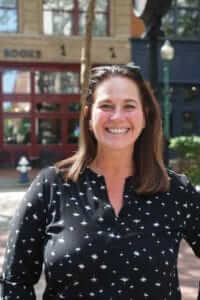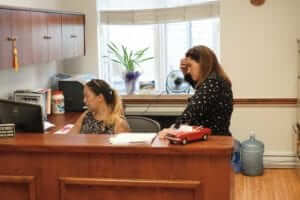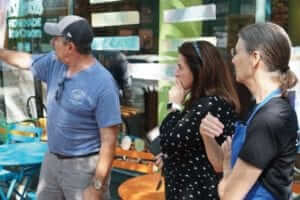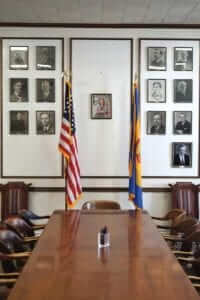Amy Goodwin is working to make Charleston vibrant again.
Amy Shuler Goodwin’s days are divided into colored blocks.

As mayor of West Virginia’s capital city, she seldom has a moment to waste. So her longtime assistant Tina Stinson devised a color-coding system on Goodwin’s computer schedule to keep everything straight.
Any event appearing in a kelly green–colored box is on Goodwin’s schedule, and she’s committed to making it happen. Maroon means the event is still pending. Gray means someone from her administration will attend in the mayor’s stead. Yellow boxes are things pertaining to her two teenage sons. “’Cause they’re bananas,” Goodwin explains.
Pink boxes are “Amy time.” Watching Goodwin scroll through her week, there aren’t many of these boxes on the schedule. When they do appear, it’s usually in the hour before sunrise. That’s when she and her husband, Booth, work out at Orangetheory Fitness.
Goodwin has already been to the gym when WV Living catches up with her on a midsummer Monday morning. She starts her day at City Hall by taking in a City Council Finance Committee meeting, where council members and her administration’s legal team are working on a new policy meant to increase the number of Charleston-based bidders on city contracts. The meeting runs longer than expected, so Goodwin ducks out and heads to her office. The next green-colored box is beckoning.
She needs to catch up on emails and phone calls. Goodwin knocked on 11,000 doors during her campaign, handing out her personal cell phone number at each one. A lot of people seem to have kept it. She does take a moment to make a personal phone call. She phones her doctor’s office to cancel an upcoming appointment, since it conflicts with an important press conference. That’s one pink box fewer on the schedule.
Now Goodwin steps into the office’s small kitchenette, where she sits across a small table from her chief of staff, Matthew Sutton. He has a sheaf of papers, all stamped at the top with a red “ASG,” that they need to sort through.
There’s a letter from the organizers of the Charleston Distance Run, who want her to fire the starting gun at this year’s race. There are notes from a few aspiring true crime writers seeking files on separate long-forgotten murder cases. There are reminders to call the new superintendent of Spring Hill Cemetery and appoint a new member to the Charleston Coliseum and Convention Center Board.
Then there’s a letter from someone who received a ticket for speeding through a work zone, which came with a fine of several hundred dollars. Goodwin has a firm policy on this kind of thing. Whether it’s a speeding ticket, a parking citation, or a littering offense, her office does not make things go away. “I’m not in the business of fixing things like that,” she says.
There are plenty of other things that need fixing.
The unrelenting schedule is nothing new for Goodwin. She comes from a family that knows what it means to work hard.
In addition to their individual teaching careers, her mother and father opened the Wheeling sporting goods shop Hole ’n Run when Goodwin was 8 years old. She still bears long, thin white scars on her left arm, the result of several careless swipes with a razor blade while regripping golf clubs.
Her parents’ busy schedules meant Goodwin and her sister Karen spent lots of time with their father’s mother, Thais Blatnik. In addition to spending nights in the converted schoolhouse her grandparents called home, Goodwin would often accompany her “Mimi” to Charleston—where she represented Ohio County in the House of Delegates.
At the time, the trips to the Capitol just seemed like a fun time. “We loved being with her because we got to stay at the Marriott and swim in the pool. You’d get room service—big cheeseburgers.” But Goodwin was also receiving a political education as she sat on the padded benches in House Finance Committee and wandered the Capitol’s marble halls to find Blatnik a can of Tab.

Goodwin also watched her white-haired grandmother stand up to her male colleagues for issues she believed in. She was particularly passionate about women’s rights. Blatnik helped push through a bill that finally allowed police to arrest men for abusing their wives.
“She was only 4-foot-11—and a half—but she acted like she was 7 feet tall, ” Goodwin says.
Goodwin got her own chance to take a stand as a student at West Virginia University. She can vividly recall sitting with her Alpha Xi Delta sisters in the green shag–carpeted TV room of their sorority house, fuming over the direction of campus politics.
It was 1992, Goodwin’s senior year at West Virginia University. She and her sorority sisters watched as less-involved students—young women, especially—fell through the societal cracks. Sexual assaults were a growing problem on campus. And yet, year after year, student government seemed to be run by the same disinterested candidates.
“We were all angry,” she says. “We said, We need to get somebody who’s engaged. We need a female who’s involved with women’s groups,” Goodwin says.
One of the sisters suggested Goodwin, who was the sorority’s president and vice-president of the campus women’s equality movement, put her name on the ballot. “I said ‘No, no, no. I’m good at being the campaign manager. I can run somebody’s campaign.’”
The next day her friend and WVU football player Steve Redd called the house’s pay phone. “He said ‘I heard you wanted to run.’ I said, ‘That’s not what you heard.’” But Red convinced Goodwin to be his running partner.
She was vice president of the student body. It was the last time her name would appear on a ballot for 25 years.
Goodwin came to Charleston to work in TV news, first behind the scenes and then on camera. That’s how she found herself in the office of Charleston Mayor G. Kemp Melton. She doesn’t remember what she was interviewing the mayor about, but at the end Melton mentioned his administration was in need of a communications director. He encouraged her to apply. She doesn’t remember much about the job interview, except that she wore a powder blue suit—and she got the job.
Although the position had Goodwin pitching stories to news outlets, answering questions from reporters, and writing speeches, the part she enjoyed most was interacting with the city’s residents. It was a year before she married Booth Goodwin. “We would get home and start talking, ‘How was your day dear?’ I’d say “I got somebody’s sewer line fixed today!’ And Booth would say ‘Oh. I just worked on some tax law.’”
She next went to work on Capitol Hill as communications director for then-Congressman Bob Wise. She aided Wise’s successful gubernatorial campaign, then ran his administration’s communications office before leaving to work for John Kerry’s 2004 presidential bid. When he lost, she took a few months off to spend time with her kids and then started doing contract communications work.
It wasn’t long before she was back under the big gold dome, though. She joined Governor Earl Ray Tomblin’s administration as his communications director. Then Tomblin named her deputy commerce commissioner and handed her the reins of the state’s tourism department. She shook up the stagnated agency, launching a national ad campaign and even renaming the entire agency “Almost Heaven.”
Goodwin and Sutton spin through City Hall’s revolving front door, descend the steps onto Virginia Street, and head east. They find Deno Stanley, owner of Adelphia Sports Bar & Grille, waiting for them at the corner of Virginia and Capitol streets.
Stanley had called Goodwin’s office earlier in the morning wanting to talk about low-hanging trees obscuring downtown traffic lights. Goodwin makes note of it, but she has something else on her mind. Traffic on Capitol Street, home of Stanley’s restaurant and other popular downtown destinations, is becoming a problem.
For years, delivery trucks have made a habit of stopping in the middle of the busy, pedestrian-heavy street to drop their loads, sometimes during the lunch rush. Cars do it, too, as drivers switch on their hazard lights and run inside to pick up their to-go orders. But things are getting out of hand as drivers working for food delivery services like DoorDash and GrubHub clog the street. One recent traffic jam almost turned deadly as a disgruntled motorist whipped around one of the stopped cars—and nearly struck two children who were legally traversing the brick crosswalk between Taylor Books and Ellen’s Homemade Ice Cream.
Stanley says he’s noticed the back-up, too. In fact, as he and Goodwin are talking, a man in a red pickup stops in front of Graziano’s Pizza, puts on his flashers, and runs inside. Then a delivery truck pulls up outside Pies & Pints to unload some boxes of food. Then a champagne-colored Hyundai SUV parks directly in the middle of the crosswalk. The driver runs to get coffee at Taylor’s. Then, not long after the delivery truck has gone, a white Ford SUV stops in the exact same spot.

Goodwin takes photos with her phone and makes notes in her black binder. She tells Sutton that police are going to have to start writing warnings, then issuing tickets. By now Ellen Beal, owner of Ellen’s, has joined Goodwin and Stanley on the sidewalk. She’s just in time to hear Goodwin unspool her dream for Capitol Street—to close it to traffic completely. She knows some people will freak out, but thinks it would ultimately be good for business. Both business owners agree.
“You’re trying to institute change,” Beal says. “Change is hard.”
The year 2016 was a rough one in the Goodwin household. That May, Booth Goodwin was bested in the state Democratic primary by a billionaire coal magnate who had no political experience. Once the primary was over, Goodwin declared no more running for office in their household. “I said ‘Never again.’” Then Jim Justice won the governor’s race, and she knew her time at Almost Heaven was coming to an end.
She was right back in that Morgantown sorority house. She wasn’t just upset about the outcome of the election; she was angry about the ineptitude of her own party, up and down the ballot. “I felt like we were running the same people, the same ideas, the same energy.”
She knew she needed to do something and, this time, she needed no encouragement from a sorority sister or football star. She signed up to run in Charleston’s upcoming mayoral election.
Goodwin felt like a gray fog had descended on the capital city. She felt like the city’s leadership had lost its vision, and its people had lost hope. And she felt she could do something about it.
“If we really want to change the state, if we really want to change the country, it starts at city hall.”
But why not run for higher office? Couldn’t she make more of a difference? Well, that’s the thing. Goodwin believes this way of thinking is one reason our national politics are the way they are. There’s not enough focus on “down ballot” races, so neither party has new blood waiting in the wings. “The governors of tomorrow are the city councilwomen of today,” she says.
Plus, if every candidate is trying to get to the governor’s mansion, or Congress, or the White House right away, they lose touch with the issues that are really affecting their communities. Mayors, meanwhile, are perfectly positioned to make a real impact on the people they serve. “If we really want to change the state, if we really want to change the country, it starts at City Hall.”
Goodwin is already making changes. As soon as she came into office, she was faced with a budget deficit of $3 million. She and her team managed to close that gap without increasing taxes or using one-time funds, by cutting travel expenses, reducing the number of city employees, ending some contracts, and nixing the free trash bag distribution program that cost the city $400,000 a year. And Goodwin still managed to increase the paving budget and funding for the police and fire departments.
In August, she rolled out an aggressive new campaign to address the city’s vacant and abandoned properties by increasing fines and creating a land bank to acquire blighted real estate.
She’s proud of her administration’s less visible successes, too, like building the youngest and most diverse administration in city history—an aggressive, passionate group Goodwin says is “up before dawn and here long after the street lights have come on.” In other words, people just like her.
On the day of Goodwin’s inauguration, a staffer from outgoing mayor Danny Jones’ administration called and said they needed a 16-by-20-inch portrait to hang in the mayor’s office suite. Goodwin, busy with more pressing matters, called her husband and asked him to have a photo printed. Then she promptly forgot all about it.
That evening, she recited her oath of office in the dark, wood-paneled council chambers on the third floor of city hall. Her husband and sons stood by her side as her father-in-law, U.S. District Judge Joseph Goodwin, performed the ceremony.
Then, after delivering a hopeful speech on the future of Charleston and officially appointing key members of her administration, Goodwin retreated with her family, friends, and supporters to the mayor’s conference room on the second floor for punch and cookies.
That’s when she saw the photo Booth Goodwin supplied.
“My heart stopped.”
Having received no direction from his wife, Booth Goodwin did not choose a traditional headshot. Instead, he picked a photo of her leaning against a Charly Jupiter Hamilton mural on the city’s West Side. “If you know anything about the artist, his pieces are colorful and dynamic and big.”
Now, in the middle of a room decorated with row after row of old men, each in shades of gray, hangs a photo of a woman. And not just any woman, but Amy Goodwin. And not just any photo, but one printed in full, vibrant, living color.

“The governors of tomorrow are the city councilwomen of today.”
Written and photographed by Zack Harold












Leave a Reply